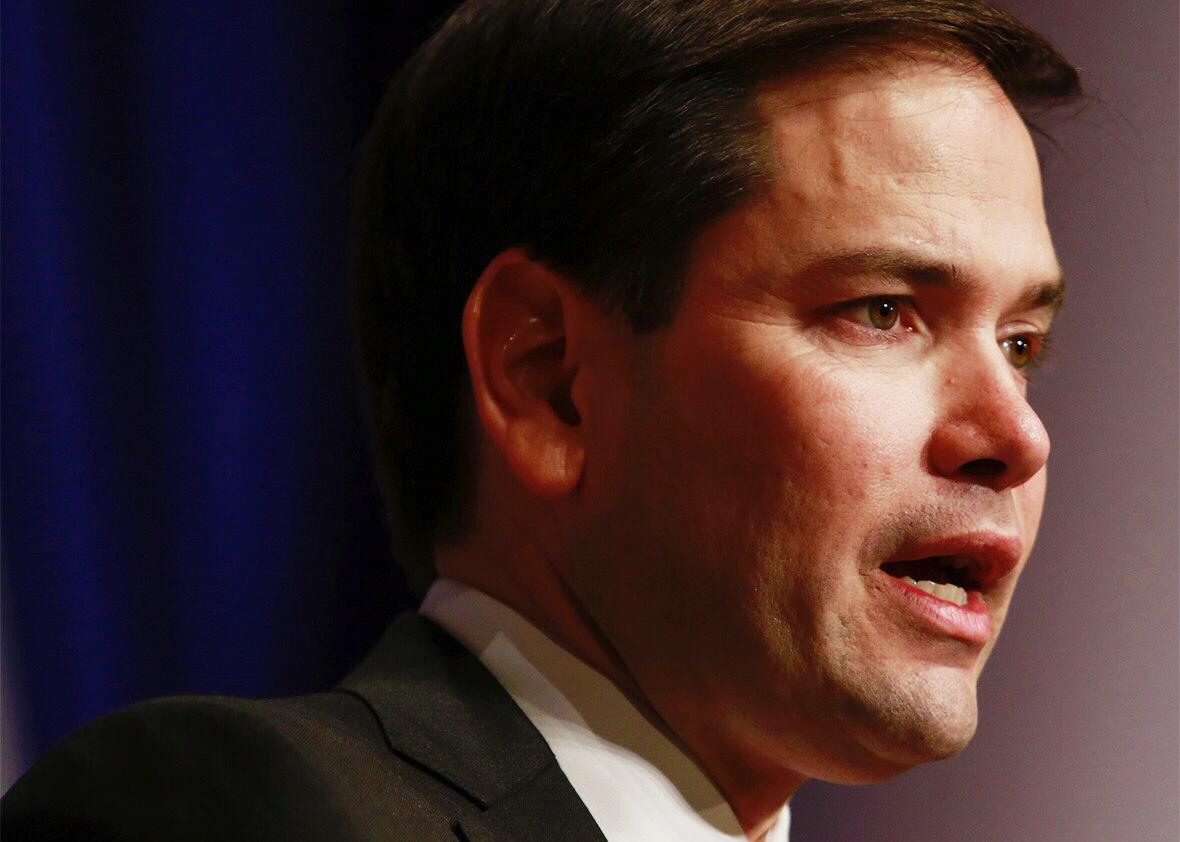Ask a political observer to name the front-runner in the Republican presidential primary—and after moaning about Donald Trump—they’ll probably offer one name: Sen. Marco Rubio.
It makes sense. Rubio is a strong political talent with a gift for rhetoric. He has an unrivaled ability to condense Republican Party ideas into sound bites tied to his story and identity. He can segue from a capsule summary of his life—“As I’ve said many times before, my parents were never rich people”—to classic conservative rhetoric. “Here’s the best way to raise wages—Make America the best place in the world to start a business or expand an existing business.”
Rubio also sits well with most Republicans. The vast majority of Republican voters would support him in a general election, and he’s well-liked in early states like Iowa and New Hampshire. Other than immigration, where he faced conservative opposition in 2013, Rubio is close to a consensus choice for the GOP, well-placed to win the nomination.
But there’s a problem. In polling and in organizing, Rubio isn’t winning. In fact, he isn’t even close.
After a modest growth through November, Rubio has settled at nearly 15 percent support in national Republican polling. He’s almost tied with Texas Sen. Ted Cruz, and far behind Trump, who pushes 30 percent in the Real Clear Politics average. But unless you’re at the bottom, like Jeb Bush, you can almost ignore national polls; they don’t tell us much about the final outcome.
Things are different for the early primary and caucus states. Heavily polled, they give us better insight into who could prevail, especially as we close the year and approach the actual contests. And in those states—Iowa, New Hampshire, and South Carolina—Rubio is far from the top.
His best performance is in New Hampshire, where he holds about 12 percent support. That puts him second to Trump’s 28.6 percent, and a few points above his establishment rivals: Bush, Ohio Gov. John Kasich, and New Jersey Gov. Chris Christie.* If they dropped out before voting, Rubio might overcome Trump. But that’s unlikely: They’ve staked their chances on the state, and they have enough money and support to make it competitive.
Rubio has two months to consolidate support in New Hampshire. Otherwise, he may lose the state to Trump, as voters—for the second time in recent memory—choose the demogogue in the GOP race. In Iowa, likewise, Trump and Cruz have the lead, with Trump falling from first and Cruz rising from second. Rubio is in fourth place, and absent a rapid surge—fueled by a major shift, like the full collapse of Bush and Fiorina—he’ll likely stay there.
Moreso than Iowa or New Hampshire, South Carolina seems like fertile ground for Rubio. Evangelicals dominate the electorate, but they aren’t as rigid as their Iowa counterparts, who often fall hard for factional candidates like Mike Huckabee and Rick Santorum. And with the exception of Newt Gingrich in 2012, they don’t back insurgents. Instead, voters in South Carolina tend to ratify the consensus choice for the nomination, whether it’s John McCain in 2008 or George W. Bush in 2000 or Bob Dole in 1996. But there as well, Rubio lags. He’s third behind Trump and Carson, and is losing oxygen to Cruz, who is surging with help from former Carson supporters.
Because polls aren’t set in stone, it’s tempting to take this all with a grain of salt. And if Rubio were hustling—if he were using his cash and support to make contacts, find supporters, and prime them for voting—that would be the right choice. But the striking fact of his campaign is that he’s not on the grind, at least not compared to his rivals.
“In recent conversations with nearly a dozen unaffiliated Iowa GOP veterans, a consensus has emerged across the party’s ideological spectrum,” write Tim Alberta and Eliana Johnson for the National Review. “The state’s caucus-goers are interested in Rubio, but his infrequent appearances and paltry field operation leave lingering doubts as to whether he is interested in them.” According to National Journal’s candidate tracker, Cruz has held 67 events in Iowa since entering the race. Rubio has held 38.
The Rubio campaign believes it can win with a “different kind of campaign that eschews spending on policy staffers, field operations, and other traditional aspects of a winning bid in favor of television advertising and digital outreach.” The Cruz team thinks differently, investing in voter contacts and direct interactions. “Ted Cruz has done perhaps the best job in the state, frankly,” says Sen. Tim Scott of the Cruz campaign in South Carolina. And while Rubio can still buckle down in New Hampshire, he must contend with Christie, who has devoted his entire campaign to winning the state.
It’s possible for Rubio to win the nomination without winning the early states. It took a month and six contests before Bill Clinton claimed his first win in the 1992 Democratic primaries. Indeed, Clinton claimed the lead with a second place finish in New Hampshire. Could Rubio do the same? Maybe, if Cruz can’t turn infrastructure into votes, and if Trump collapses. Or, if he sees an opening and consolidates the establishment behind his candidacy. Or even if the race comes to him and Cruz. But those are big “ifs.”
When Rubio entered the race, he was the promising candidate who faced major hurdles to success. Now, eight months later, he’s in the same position. Everything on paper says Rubio is the guy. Everything on the ground, so far, says we shouldn’t hold our breaths.
Correction, Dec. 10, 2015: This article originally misspelled Gov. John Kasich’s last name. (Return.)
